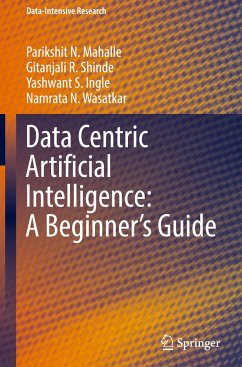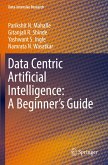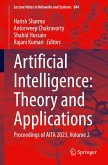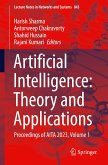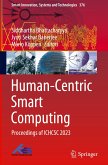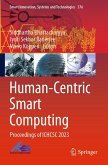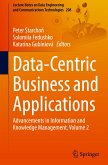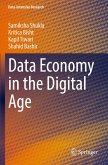Parikshit N. Mahalle, Gitanjali R. Shinde, Yashwant S. Ingle
Data Centric Artificial Intelligence: A Beginner's Guide
Parikshit N. Mahalle, Gitanjali R. Shinde, Yashwant S. Ingle
Data Centric Artificial Intelligence: A Beginner's Guide
- Gebundenes Buch
- Merkliste
- Auf die Merkliste
- Bewerten Bewerten
- Teilen
- Produkt teilen
- Produkterinnerung
- Produkterinnerung
This book discusses the best research roadmaps, strategies, and challenges in data-centric approach of artificial intelligence (AI) in various domains. It presents comparative studies of model-centric and data-centric AI. It also highlights different phases in data-centric approach and data-centric principles. The book presents prominent use cases of data-centric AI. It serves as a reference guide for researchers and practitioners in academia and industry.
Andere Kunden interessierten sich auch für
![Data Centric Artificial Intelligence: A Beginner's Guide Data Centric Artificial Intelligence: A Beginner's Guide]() Parikshit N. MahalleData Centric Artificial Intelligence: A Beginner's Guide112,99 €
Parikshit N. MahalleData Centric Artificial Intelligence: A Beginner's Guide112,99 €![Artificial Intelligence: Theory and Applications Artificial Intelligence: Theory and Applications]() Artificial Intelligence: Theory and Applications164,99 €
Artificial Intelligence: Theory and Applications164,99 €![Artificial Intelligence: Theory and Applications Artificial Intelligence: Theory and Applications]() Artificial Intelligence: Theory and Applications149,99 €
Artificial Intelligence: Theory and Applications149,99 €![Human-Centric Smart Computing Human-Centric Smart Computing]() Human-Centric Smart Computing176,99 €
Human-Centric Smart Computing176,99 €![Human-Centric Smart Computing Human-Centric Smart Computing]() Human-Centric Smart Computing176,99 €
Human-Centric Smart Computing176,99 €![Data-Centric Business and Applications Data-Centric Business and Applications]() Data-Centric Business and Applications149,99 €
Data-Centric Business and Applications149,99 €![Data Economy in the Digital Age Data Economy in the Digital Age]() Samiksha ShuklaData Economy in the Digital Age112,99 €
Samiksha ShuklaData Economy in the Digital Age112,99 €-
-
-
This book discusses the best research roadmaps, strategies, and challenges in data-centric approach of artificial intelligence (AI) in various domains. It presents comparative studies of model-centric and data-centric AI. It also highlights different phases in data-centric approach and data-centric principles. The book presents prominent use cases of data-centric AI. It serves as a reference guide for researchers and practitioners in academia and industry.
Produktdetails
- Produktdetails
- Data-Intensive Research
- Verlag: Springer / Springer Nature Singapore / Springer, Berlin
- Artikelnr. des Verlages: 978-981-99-6352-2
- 1st edition 2023
- Seitenzahl: 140
- Erscheinungstermin: 11. Oktober 2023
- Englisch
- Abmessung: 241mm x 160mm x 14mm
- Gewicht: 383g
- ISBN-13: 9789819963522
- ISBN-10: 9819963524
- Artikelnr.: 68551415
- Herstellerkennzeichnung Die Herstellerinformationen sind derzeit nicht verfügbar.
- Data-Intensive Research
- Verlag: Springer / Springer Nature Singapore / Springer, Berlin
- Artikelnr. des Verlages: 978-981-99-6352-2
- 1st edition 2023
- Seitenzahl: 140
- Erscheinungstermin: 11. Oktober 2023
- Englisch
- Abmessung: 241mm x 160mm x 14mm
- Gewicht: 383g
- ISBN-13: 9789819963522
- ISBN-10: 9819963524
- Artikelnr.: 68551415
- Herstellerkennzeichnung Die Herstellerinformationen sind derzeit nicht verfügbar.
Dr. Parikshit Narendra Mahalle is Senior Member in IEEE and is Professor, Dean Research, and Development and Head-Department of Artificial Intelligence and Data Science at Vishwakarma Institute of Information Technology, Pune, India. He completed his Ph.D. from Aalborg University, Denmark, and continued as Postdoc Researcher at CMI, Copenhagen, Denmark. He has 23 + years of teaching and research experience. He is Ex-Member of the Board of Studies in Computer Engineering and Ex-Chairman of Information Technology, Savitribai Phule Pune University and various universities and autonomous colleges across India. He has 15 patents and 200+ research publications (Google Scholar citations-2900 plus, H index-25, and Scopus Citations are 1400 plus with H index-18, and Web of Science citations are 438 with H index- 10) and authored/edited 54 books with Springer, CRC Press, Cambridge University Press, etc. He is Editor-in-Chief for IGI Global-International Journal of Rough Sets and Data Analysis, Inter-science International Journal of Grid and Utility Computing; Member in Editorial Review Board for IGI Global-International Journal of Ambient Computing and Intelligence; and Reviewer for various journals and conferences of the repute. His research interests are Machine Learning, Data Science, Algorithms, Internet of Things, Identity Management, and Security. He is guiding 8 Ph.D. students in the area of IoT and machine learning, and six students have successfully defended their Ph.D. under his supervision from SPPU. He is also the recipient of "Best Faculty Award" by Sinhgad Institutes and Cognizant Technologies Solutions. He has delivered 200 plus lectures at national and international level. Dr. Gitanjali R. Shinde has overall 15 years of experience and presently working as Head and Associate Professor in Department of Computer Science & Engineering (AI & ML), Vishwakarma Institute of Information Technology, Pune, India. She has done Ph.D. in Wireless Communication from CMI, Aalborg University, Copenhagen, Denmark, on Research Problem Statement "Cluster Framework for Internet of People, Things and Services"-Ph.D. awarded on May 8, 2018. She obtained M.E. (Computer Engineering) degree from the University of Pune, Pune, in 2012 and B.E. (Computer Engineering) degree from the University of Pune, Pune, in 2006. She has received research funding for the project "Lightweight group authentication for IoT" by SPPU, Pune. She has presented a research article in the World Wireless Research Forum (WWRF) meeting, Beijing, China. She has published 50+ papers in national and international conferences and journals. She is Author of 10+ books with publishers Springer and CRC Taylor & Francis Group, and she is also Editor of books. Her book "Data Analytics for Pandemics A COVID 19 Case Study" is awarded outstanding book of year 2020. Mr. Yashwant Ingle is presently working at VIIT, Pune, as Assistant Professor at the Department of Artificial Intelligence and Data Science. The author has 12 years' experience in Teaching and 3 years Industry Experience. The author is pursuing his Ph.D. from Savitribai Phule Pune University, completed his M.Tech. CSE from Visvesvaraya National Institute of Technology, Nagpur, and B.E. CSE from Amravati University. Author has 1 US patent published, 15 Indian utility patents published, 3 design patents granted, 3 important software copyrights, and 2 literary research copyrights registered. He also has 25+ publications in Scopus and Web of Science journals, IEEE, and Springer international conferences and received 4 best paper awards in RACE National Conference 2021. The author is Life Member of ISTE, VNIT Alumni Association, and Member of ACM. The author regularly teaches AI honor course and AI regular course, soft computing, and optimization algorithms to third year and finalyear of Computer Engineering. The author has undergone vigorous trainings in FDPs and professional courses on subject matter AI. Dr. Namrata N Wasatkar has overall 10 years of experience and presently working Assistant Professor in Department of Computer Engineering, Vishwakarma Institute of Information Technology, Pune, India. She has done Ph.D. in Computer Engineering from Savitribai Phule Pune University, Pune, India, on Research Problem Statement "Rule based Machine translation of simple Marathi sentences to English sentences"-Ph.D. awarded on November 17, 2022. She obtained M.E. (Computer Engineering) degree from the University of Pune, Pune, in 2014 and B.E. (Computer Engineering) degree from the University of Pune, Pune, in 2012. She has received research funding for the project "SPPU online chatbot" by SPPU, Pune. She has published 10+ papers in national and international conferences and journals.
Introduction.- Model-Centric AI.- Data-Centric Principles for AI Engineering.- Mathematical Foundation for Data Centric AI.- Data-Centric AI.- Data-Centric AI in healthcare.- Data-Centric AI in Mechanical Engineering.- Data-Centric AI in Information Communication and Technology.- Conclusion.
Introduction.- Model-Centric AI.- Data-Centric Principles for AI Engineering.- Mathematical Foundation for Data Centric AI.- Data-Centric AI.- Data-Centric AI in healthcare.- Data-Centric AI in Mechanical Engineering.- Data-Centric AI in Information Communication and Technology.- Conclusion.
Introduction.- Model-Centric AI.- Data-Centric Principles for AI Engineering.- Mathematical Foundation for Data Centric AI.- Data-Centric AI.- Data-Centric AI in healthcare.- Data-Centric AI in Mechanical Engineering.- Data-Centric AI in Information Communication and Technology.- Conclusion.
Introduction.- Model-Centric AI.- Data-Centric Principles for AI Engineering.- Mathematical Foundation for Data Centric AI.- Data-Centric AI.- Data-Centric AI in healthcare.- Data-Centric AI in Mechanical Engineering.- Data-Centric AI in Information Communication and Technology.- Conclusion.

